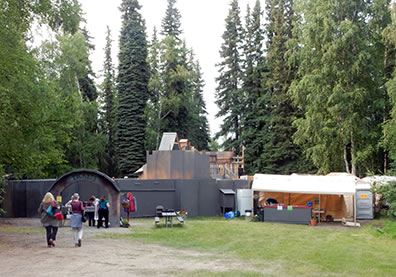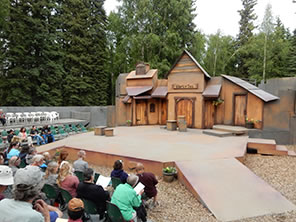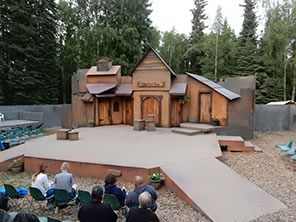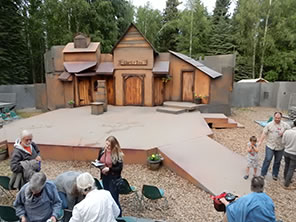The Merry Wives of Windsor
Digging Up Shakespeare Gold in Alaska
Fairbanks Shakespeare Theatre, Jack Townshend Point, Fairbanks, Alaska
Saturday, July 7, 2018 Center section, front row of raised platform (fourth row overall)
Directed by Tom Robenolt
William Shakespeare coined so many famous phrases that at least one or two popped into your head as you read this sentence, maybe four and then a fifth. Some readers might already have left off this review altogether to recite dozens more. I bet, though, that one particular 2 1/2-word phrase hasn’t yet entered any readers' minds as a famous Shakespeare quote, even though it can be one of the funniest three words in Western literature.
“A buck-basket?”

Audiences arrive at Jack Townshend Point on the University of Alaksa–Fairbanks where the Fairbanks Shakespeare Theatre is set to perform William Shakespeare's The Merry Wives of Windsor. Photo by Eric Minton.
Granted, conditions have to be just right for this phrase to attain immortality, and in this Fairbanks Shakespeare Theatre production of Shakespeare’s The Merry Wives of Windsor, conditions create a perfect storm of laughter. First, there are the portrayals of two classic Shakespeare characters, Sir John Falstaff and Master Frank Ford. Next, there is the staging of the buck-basket scene itself as Falstaff escapes Ford’s house during a tryst with Mistress Alice Ford literally under Master Ford’s nose by riding in a buck-basket otherwise filled with dirty laundry, a scene that never fails to please and sometimes rises to exquisitely uproarious hilarity. Finally, there is the timing and expression Ford displays, disguised as Master Brook, when Falstaff tells him, with great indignity, how “they conveyed me into a buck-basket.” “A buck-basket?” cries Ford and, if the blend of astonishment and fury upon discovering how he was gulled is just right, it’s precious.
There’s another condition on this particular night in Fairbanks, Alaska: an actor so adept with Shakespeare’s texts that he gleans spectrums of nuanced purposes out of any and every line he plays, including “a buck-basket?” which he lifts to the pantheon of premier Shakespeareances. On an outdoor stage in a stockade-like, 200-seat theater (half-filled on this night) surrounded by skyscraping pines on the University of Alaska–Fairbanks campus, a hardy company of actors performs in the universal light of the almost-midnight sun, presenting a slap-happy but serious-edged Merry Wives, audacious in presentation but textually pure in execution.
Though the breadth of talent across the cast (a total of 23) is thin, the company is deep at its core. If you know Fairbanks, that’s not surprising. This is a culturally rich little city, its population of 32,000, holed up for four below-zero winter months in the land of almost-noontime night. People ply arts and crafts until the spring thaw unleashes a slew of outdoor activity—including performing Shakespeare. Wisconsin native Bruce Rogers, a preternaturally adventurous spirit, traveled up the Alcan Highway to paint houses in Fairbanks and fell in with a few fellow Bard lovers. They decided to stage a play and launched Fairbanks Shakespeare Theatre in 1992. Shakespeare had come to central Alaska and inspired a new generation of now-smitten Bard lovers. Rogers didn't rest on the troupe's initial laurels, though. He went to England, cornered theater director Graham Watts, and convinced him to come to Fairbanks and direct a Shakespeare play. Watts returned for eight subsequent seasons, instilling in the fledgling company the performance philosophies that formed the foundation of his book, Shakespeare's Authentic Performance Texts: The Case for Staging from the First Folio. That skill set is evident in the cast on this night, especially with Rogers playing Master Ford.
Another key contributor to the company and this production in particular is Director Tom Robenolt. A longtime company member who went on to work with the Perseverance Theatre in Juneau, Alaska, he took the helm of this Merry Wives two weeks before rehearsals began after the originally hired director dropped out. The production was originally conceived for an Old American West setting but Robenolt scrapped that idea in favor of a traditional Elizabethan setting and costumes. Greg Gustafson’s set still has remnants of a Hollywood Western façade, but Lara Lotze’s costumes are ruff collars, gowns, and doublets.
Robenolt was bound both by aesthete—the only play Shakespeare set in his own time and place works best when staged in that time and place, he feels—and by the need to simplify demands on his cast. For this company, that means hewing to the First Folio in diction and direction. With a cast primarily comprising amateurs, Robenolt chooses to go broad with performances, allowing the actors to ham it up. Nevertheless, the over-the-top behavior we see on stage is organic to the play. All of it is dictated by pointers in the text, resulting in what very well could be an accurate revival of Shakespeare’s original staging of this play.
Of course, Shakespeare’s lead character in this play is as over-the-top as they come, and another company vet, Andrew Cassel, plays Falstaff with a personality as overblown as the fat suit makes him appear physically. He establishes his persona from the instant he explodes onto the stage, even before speaking his first line. He stands in a classic Falstaff Beer pose, over-pouring the sack into his tankard, splashing as much on the flour as ends up in his vessel, and then sloppily pouring what’s in that tankard down his throat with much of it also cascading down his neck. Between this opening scene and the buck-basket aftermath, Cassel spends much of the evening in a perpetual state of drench. Pompous drinking done, Cassel finally delivers his first line, and he presents Falstaff with the most majestic of voices, not merely speaking but pontificating commands, insults, romantic come-ons, and self-aggrandizing statements. It’s all ridiculously funny. It’s all intelligently sublime, too, from the opening scene in which Falstaff and his followers bully Slender (Michael McOsker) to the final scene at Hern’s Oak when the merry wives punk Falstaff one last time. As Cassel dons his antlers, the audience breaks into applause in appreciation of the moment and all that’s led up to it, a badge of the production's success.
This production, the 12th I’ve seen of this play, unearths several gem moments, such as how Mistress Margaret Page (Susie Duecker) reads her love letter from Falstaff. She tears into it excitedly, eager to find out who the mysterious love interest might be. “What, have I scaped love-letters in the holiday-time of my beauty, and am now a subject for them?” she says as she opens the letter, a subtext that in her boring marriage she’s perhaps ready to be merry in more than one way. She stumbles when she comes to her name, pausing to make out the handwriting. Not until she gets to the signature, “John Falstaff,” does she show disappointment and then resentment. Then we realize why she stumbled over her name in the letter: As she points out to Mistress Ford (Annabel Heyne) when the two compare their letters from Falstaff, “I warrant he hath a thousand of these letters, writ with blank space for different names.”
Rogers similarly dissects every one of his lines in his portrayal of Master Ford, then uses the warring emotions inside the language as a jumping off point for his performance. It's a skyscraper ledge Rogers is preparing to jump from. Fully understanding the staging conditions for which Shakespeare wrote, Rogers goes beyond direct address to directly engage with audience members. He explodes the fourth wall and leans dangerously into the fifth wall of personal space, moving among the seats in front of the stage. This amps up Ford’s psychosis, enveloping us in his paranoia, and creates effective running jokes. In the buck-basket scene, the hidden Falstaff sneezes, and Rogers looks at a man in the audience suspiciously. In their meeting after the buck-basket scene, Sir John sneezes behind Ford’s back, and Rogers again looks at the man in the audience and seems ready to accost him then and there. His intention is waylaid by Falstaff continuing the account of his interrupted tryst with Mistress Ford, and what happens next is tour de force acting by Cassel and Rogers.
Falstaff is in his element regaling Brook, as he thinks, with “what I have suffered to bring this woman to evil for your good.” Cassel raises the pitch and solemnity of his delivery and, with grand gravitas, describes how
I suffered the pangs of three several deaths; first, an intolerable fright, to be detected with a jealous rotten bell-wether; next, to be compassed, like a good bilbo, in the circumference of a peck, hilt to point, heel to head; and then, to be stopped in, like a strong distillation, with stinking clothes that fretted in their own grease: think of that—a man of my kidney—think of that—that am as subject to heat as butter; a man of continual dissolution and thaw: it was a miracle to scape suffocation. And in the height of this bath, when I was more than half stewed in grease, like a Dutch dish, to be thrown into the Thames, and cooled, glowing hot, in that surge, like a horse-shoe; think of that—hissing hot—think of that, Master Brook.
In Cassel’s telling, this is downright Homeric.
What can Ford do with this performance but—laugh? Uncontrollably. Once over his astonishment that Falstaff escaped right past him in the buck-basket, Rogers’ Ford begins giggling as Falstaff lays on the pathos and begins laughing at how his wife notoriously abused his supposed love rival, morphing into crying to cover up the laughter when Falstaff directly addresses him. Then, Falstaff announces another assignation that hour, and Ford morphs again: this time into heightened psychotic state of perplexity.
Hum! ha! is this a vision? is this a dream? do I sleep? Master Ford awake! Awake, Master Ford! there's a hole made in your best coat, Master Ford. This 'tis to be married! this 'tis to have linen and buck-baskets!
Not only is this supremely funny in the moment, Rogers gives it all such a dichotic reading as to get to the heart of Ford’s conflicted understanding of marriage.



The Fairbanks Shakespeare Theatre uses the ultimate in universal lighting for its outdoor Jack Townshend Point theater: central Alaska's midnight sun. Top, the company's production of William Shakespeare's The Merry Wives of Windsor is about to start at 7:30 p.m. Center, the audience waits out iintermission at 9 p.m. Bottom, patrons prepare to leave after the curtain calls at 10:10 p.m. Photos by Eric Minton,
Which is supremely important in this production, for Robenolt gives this broadly played comedy a strikingly serious edge via Ford’s abusive behavior toward his wife. Rogers' Ford issues orders to his wife with unrelenting curtness. Mistress Ford complains to Mistress Page about Ford’s jealous nature, but also stands up, briefly, to him in regard to his quick temper. “How now, sweet Frank, why art thou melancholy?” she asks, Heyne using a guardedly caring tone. “I melancholy?” he replies, Rogers using an accusatory tone (he’s just learned of Falstaff’s planned attempt to cuckold him): “I am not melancholy. Get you home, go.” Mistress Ford, used to this tone and accompanying look, says resignedly—yet Heyne retains her guarded manner—“Faith, thou has some crotchets in thy head now,” and retreats to Mistress Page.
The weight of this interpretation falls on Heyne playing Mistress Ford as a merry wife who is yet a victim of abuse. A 10-year company veteran though she’s only 18 years old, Heyne is more than up to the challenge. She stiffens in Ford’s presence, finds shelter in Mistress Page’s friendship, and gains empowerment through her manipulations of Falstaff and its unexpected collateral impact on Ford. In my interview with Heyne, she told me she didn’t initially want to play what to her and Robenolt is obvious in the text, but she came to embrace the thematic arc with its ultimate payoff: Ford telling her, “Pardon me, wife. Henceforth do what thou wilt,” which Rogers delivers with sincere humility. Ford has seen what she’s capable of doing to Falstaff, and with the full truth now revealed, he regards himself as “an heretic.” The moment brings a sense of relief for the audience, which is typical of almost every Shakespeare comedy, with stays of execution and villains forgiven or redeemed. Ford's villainy, being more ubiquitously evil than what we get in other Shakespeare comedies, is perhaps easier for other directors to shunt aside, as society as a whole tends to do with the evil of spouse abuse. Ford's sincere repentance also factors into the final scene when he serves as the reconciler for all the at-odds parties, and he gets the last laugh, one that, through Rogers' performance, resonates through his own self-realization: “Sir John, to Master Book you yet shall hold your word, for he tonight shall lie with Mistress Ford.”
For all the skill, intelligence, and discovery Rogers, Cassel, and Heyne bring to this production, the show-stealing star is Jared Olin playing Doctor Caius, the French doctor and one of the suitors to the Page’s daughter, Anne (Eleanor Adasiak). Olin is relatively new to theater (a student at the university's film and performance arts program) and making his Fairbanks Shakespeare Theatre debut. He plays Caius as an ornate cavalier, more musketeer than medical man with an accent more Spanish than French; perhaps he’s from southern France. Though an acolyte when it comes to verse-speaking, Olin is pretty good with a sword, cutting off Simple’s beard with a single swipe of his blade (Simple, played by Ben Coffroth, reattaches the beard) and then undressing Simple with a few more flicks.
Margaret Page is pushing for her daughter to marry Dr. Caius for his social connections, but in this production, Mom herself has a crush on Olin’s doctor. Textual support: “The doctor is well money’d, and his friends potent at court: he, none but he, shall have her, though twenty thousand worthier come to crave her.” This is a mother who eagerly tears into a mysterious love letter, so what could inspire her to keep “twenty thousand worthier” at bay other than her own infatuation with the man? When Mistress Page gives Caius instructions for snatching Mistress Anne away in the Hern’s Oak finale, Olin puts his finger on Duecker's lips. “I know vat I have to do. Adieu,” he coos, and she just melts.
Olin still has much to learn about the craft of acting, but he already has tremendous stage presence, and I urge anybody planning to mount a production of Love’s Labour’s Lost to get up to Fairbanks and fetch him to play Don Armado. The rest of you, heed the call of the North: there’s Shakespeare gold in Alaska.
Eric Minton
July 27, 2018
Comment: e-mail [email protected].
Start a discussion in the Bardroom




 Find additional Shakespeareances
Find additional Shakespeareances